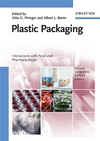The Chicago City Council’s decision to ban plastic shopping bags will damage the plastics manufacturing industry’s ongoing efforts to create and maintain American manufacturing jobs, according to SPI: The Plastics Industry Trade Association.
The city council voted Wednesday to ban the use of all plastic shopping bags from retailers including grocery stores and chains with more than three locations or franchise stores of more than 10,000 square feet. The ordinance takes effect August 2015.
The Chicago City Council’s decision to ban plastic shopping bags will damage the plastics manufacturing industry’s ongoing efforts to create and maintain American manufacturing jobs, according to SPI: The Plastics Industry Trade Association.
The city council voted Wednesday to ban the use of all plastic shopping bags from retailers including grocery stores and chains with more than three locations or franchise stores of more than 10,000 square feet. The ordinance takes effect August 2015.









